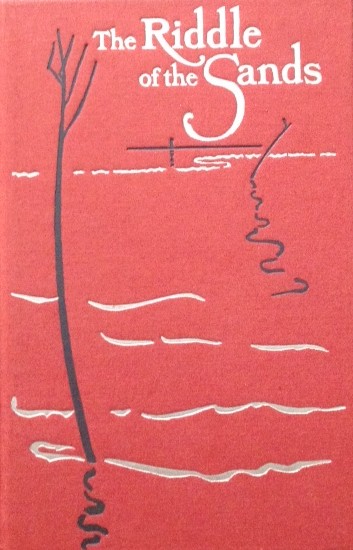Inspiring Older Readers
 posted on 17 Oct 2021
posted on 17 Oct 2021
Riddle of the Sands by Erskine Childers
Erskine Childers wrote just one novel but lived a hell of a life – short though it turned out to be. Born in 1870 with English-Irish connections, he became a supporter of Irish Republicanism, smuggled guns on their behalf and was eventually executed by firing squad in 1922 by the leaders of what would become the Irish Free State.
His book, Riddle of the Sands, was published in 1903 and has become recognised as a classic thriller of the espionage or spy genre that redefined and established many of the rules that this kind of fiction would follow. His influence on writers like John Buchan and plenty of less skilled followers who came along later is obvious to see and critics - Alice Fisher writing in The Guardian in 2009 for example - argue his influence can still be traced through to modern writers like Ken Follett.
For Childers this was less a novel and more a fictional warning of what he saw as the truth of the geo-political antagonism between Britain and Germany. This belief in his mission to warn about possible forthcoming war almost certainly dictates his almost documentary approach to the construction of the story and leads him to ensuring that all the details of the book are meticulously accurate – sea charts and maps are precise and true to reality and the painstaking reconstruction of boating and yachting in the Baltic and around the northern German islands is carefully reconstructed.
The adventure starts with a bored, young, middle-ranking Foreign Office civil servant, Carruthers, accepting an offer to join an old school friend, Davies, who is ostensibly on a late sailing holiday around the Baltic northern islands of Germany. Carruthers is very much a landlubber and we follow him through the process of buying all his equipment and having to undertake something of a crash course in sailing from the oddly inscrutable Davies – whose mind always seems to be somewhere else.
Gradually it emerges that Davies has an ulterior motive for wanting Carruthers to join him – he believes he’s stumbled on some nefarious plans the Germans have for an invasion of Britain. The evidence he’s got seems largely circumstantial and he needs help to collect more information about just what’s going on amongst the sandbanks of the Frisian Islands.
Davies tells Carruthers of his meeting with the mysterious entrepreneur, Dollmann and his expensive yacht, who at first befriends him and then appears to lead him into mortal peril and abandons him to his fate. Just to complicate things, Dollmann turns out to have a daughter, Clara, who Davies has fallen in love with. Davies believes Dollmann’s treacherous abandonment of him to his fate is the result of his almost stumbling on evidence of the German plans.
What follows is a complex story of double-dealing, double-agents, bluff and derring-do. It is in fact Carruthers who manages to put all the parts together and a dastardly and quite advanced plan for the invasion of Britain emerges. He and Davies escape in time to head back to Britain to raise the alarm.
Childers was driven to write the book by his belief that the British government was neglecting their duty and failing to acknowledge the political realities of German ambition. The book ends with a detailed account of how the plans to invade were to be made a reality – presented as if it were the true life report prepared by Dollmann – designed to show that the plot may be fictional but not necessarily fanciful. For Childers the writing of the book was an act of patriotism rather than artistic fantasy.
I enjoyed the book a lot more than I had expected to. I went to it thinking I was going to have to reconcile myself to a tub-thumping piece of Edwardian patriotic propaganda – but that’s not what it was at all. The journey Carruthers makes is fascinating: the details of his accelerated apprenticeship in sailing, the details of sailing perils around the Baltic and his emergence as something of a national hero in the making are all compelling and, once you’ve adjusted to the prose style, really well written.
Paperback and hardback reprints are easy to find and not at all expensive.
Terry Potter
October 2021